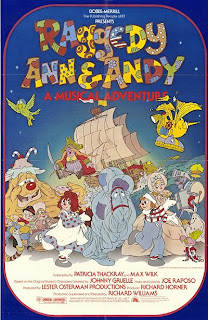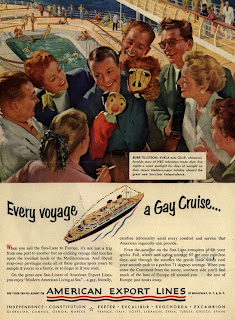Werth: Trust me, Wise. I won't let you fall in our filmic tribute to the April 4th 3D release of the second biggest movie moneymaker of all time.
Wise: In which Kate Winslet shows her own two biggest moneymakers.
Werth: Being an historic obsessive about the Titanic tragedy, I was impressed by James Cameron's attention to detail and the beauty of the ship—not to mention getting my glasses all wet as I projectile boo-hoo'ed when the ship went down.
Wise: While the Titanic story may be the most famous, plenty of other ships have made appearances in great movies... and also in some not-so-great movies, like Raggedy Ann & Andy: A Musical Adventure (1977).
Werth: Wise, we're talking about one of the most successful disaster films of all time and you bring up a kiddie flick about dolls.
Wise: It may be a kid flick, but it was a huge disaster, prominently features a pirate ship, plus it sank at the box office as soon as it arrived in theaters. And—as you well know—I'll use any excuse to talk about insane kid movies.
Werth: Well, when you put it that way...
Wise: The film opens on Marcella's seventh birthday and all the toys in the playroom are curious about the enormous present that has arrived from Paris. After the package is opened and pouty porcelain poupée Babette is introduced, a pirate captain escapes from his snow globe, kidnaps the new doll, and sails away in his sea rover. Raggedy Ann and Andy then set out to rescue Babette and save Marcella's birthday.
Werth: Please tell me Marcella takes them on the maiden voyage of the R.M.S. Titanic... in third class.
Wise: Oh, believe me, even the Carpathia wouldn't have picked up this bedraggled mess. Raggedy Ann had been a beloved character since she was first introduced by Johnny Gruelle in 1915, but aside from a couple animated shorts in the early 1940's, she had languished as a toy and a moderately successful publishing enterprise for many years. In the 1970's, however, the popularity of Ann and her brother Andy was on the rise, and The Bobbs-Merrill Company, which owned the rights to the characters, was anxious to bring them to an even wider audience.
Werth: It's strange to think that the decade that brought us KISS and Star Wars also brought us this red-haired bag of fluff.
Wise: Because Bobbs-Merrill had such high hopes for the project, they enlisted some top talent: Muppet collaborator Joe Raposo to write the music; a pre-Grease Didi Conn as the voice of Ann; and a host of animators from the Golden Age of Disney and Warner Bros. to bring the characters to life.
But despite this surplus of skill, the film is a wreck with underdeveloped characters, an overabundance of songs, plus the most trippily psychedelic sea of living taffy you can imagine.
Werth: I would need psychedelics to sit through it...
Wise: Director Richard Williams (who went on to win an Oscar for directing the animation in Who Framed Roger Rabbit?), fought endlessly with the producers trying to get a better script and more time for the animators to work, but was forced from the project when the producers grew tired of delays. That contentiousness reveals itself in the final film where most of the minor characters are unappealing, if not downright repulsive.
Still, there are some wonderful moments like the transition from the live-action frame story to the animated middle where the toys come to life and the wonderfully absurd Camel with the Wrinkled Knees. It's not a great movie—not even a good one—but in some ways it predicted the phenomenal success of the Toy Story franchise, and it sticks with me as a sentimental favorite.
Werth: One of my favorite boat movies isn't always remembered as such. The Empire State Building bogarts most of the attention in Leo McCarey's An Affair to Remember (1957), but the majority of the action takes place on a transatlantic cruise aboard the S.S. Constitution. Cary Grant plays Nickie Ferrante a frustrated playboy who isn't finding life in the fast-lane all that fulfilling.
Wise: Swanning around in a tuxedo is definitely hard work.
Werth: Enter the lovely Deborah Kerr as Terry McKay, a former nightclub singer whose no nonsense approach to life should repel Mr. Ferrante and his expensive cigarette case— but of course, it doesn't. Love blossoms as the two flirt and canoodle from stem to stern being careful to be discreet, because both of them are already publicly involved with someone else.
Wise: Why are the best ones always taken?
Werth: A shore-leave excursion to the enchanted Mediterranean garden and home of Nickie's grandmother (Cathleen Nesbitt) seals the deal and by the end of the cruise Nickie and Terry have realized that what was missing in their lives was each other.
So the two set a date six months later, and if they have dumped their current sugar-daddy/mommy and found a way to earn their own money, they will meet at the top of the Empire State Building to live happily ever after.
Wise: But everyone knows that doesn't happen.
But what is really memorable about Affair is what happens after Nick leaves the ESB alone. The crippling doubt coupled with unlikely hope gives the film an emotional depth other happy-ending romances just don't have. And with the impeccable Grant and Kerr on board, this is one ship movie that I want to sail on over and over.
Wise: Unless we hit an iceberg, we'll be sailing full speed ahead to next week's Film Gab!















No comments:
Post a Comment